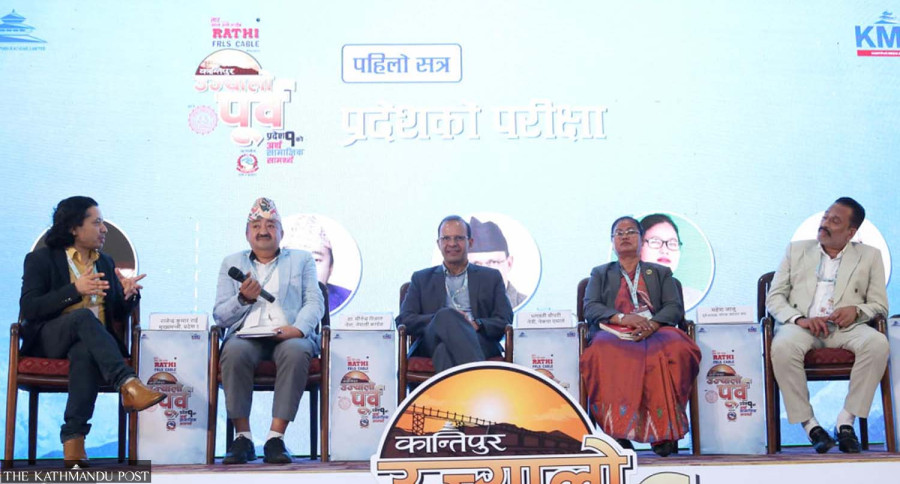National
Leaders, entrepreneurs discuss eastern Nepal’s economic potentials, challenges
The event ‘Ujyalo Purva’ saw politicians, entrepreneurs discuss policies impacting commerce in the east.
Post Report
Imposition of restrictive measures in trade to control the foreign exchange reserve going out of the country has done little to solve Nepal’s economic problem, political leaders and entrepreneurs said at a function on Saturday.
Speaking as a keynote speaker at ‘Ujyalo Purva’, an event organised by the Kantipur Media Group in Biratnagar, Gagan Thapa, general secretary of Nepali Congress, said that despite restrictive measures in place, the country’s economy has shown no sign of improvement.
“When our GDP is increasing by five percent, the import should have increased by 20 percent but it has increased by 50-60 percent,” Thapa said. “We chose an easy way which created the current situation with strained foreign exchange reserves.”
Thapa added that the new government to be formed after upcoming federal and provincial elections should take a bold measure to address the country’s economic problems.
“We are sending thousands of youths abroad and the remittance is being used for consumption and on imported goods,” Thapa said.
Speaking at the event, political leaders explained Province-1’s potential in different sectors such as tourism, service and industry.
Surendra Pandey, vice-president of CPN-UML, said that the immense potential of hydropower can be a game changer in the development of eastern Nepal.
“Tea is one of the major products of the region and as the Indian government is planning to impose a 40 percent tax on green leaves exported from Nepal, the Nepal government should immediately negotiate with New Delhi to resolve the problem,” Pandey said.
Barshaman Pun, deputy general secretary of CPN (Maoist Centre), said that as the country has adopted a federal system, the provinces should work with a competitive spirit, which is the basic concept of federalism. Stating that the growth rate of Province-1 after adoption of the federal system has remained slow, he said the province was not able to take advantage of the new system.
Pun added Province-1 can be a hub for hydropower and its potential market can be India and Bangladesh.
Mahesh Jaju, former chairman of Morang Merchant Association, said they were compelled to take to the streets to protest wrong policies. “We were compelled to take to the streets against the wrong policy on galvanised iron (GI) wire and sanitary pad,” Jaju said.
Jaju also complained about the high interest rates. “Biratnagar will protest against high interest rates,” he said.
He added that many people had chosen trading businesses rather than investing in the productive sector due to frequent changes in government and policies.
Former chairman of Morang Merchant's Association Pawan Sharda complained that Biratnagar, which was considered a second most significant city economically after Kathmandu, has now gradually been left behind by other emerging cities.
Young entrepreneurs of Province-1 pointed out some policy lapses on the part of the government.
Anupam Rathi, senior vice president of Morang Merchant's Association, underscored the need for stable, sustainable and progressive policies.
Rathi asked the government to address problems caused by illegal trade through open borders, high cost of production and labour issues.
Kabin Shrestha, chairman of Lemon Tree Premier Hotel and president of Rotary Club of Biratnagar, said formulating policies alone wouldn’t work if the implementation aspect is poor. “For young entrepreneurs like us, instability in government is a major challenge,” he said.
He termed the high interest problem as “interest terrorism” that emerged due to unhealthy competition among commercial banks.
Shruti Sharma, chairman of Kinder Piller School, said banks discouraged young women from starting a business as it was very tough for a woman to get loans from banks.
Suwarna Das Shrestha, former chairman of Independent Power Producers' Association, Nepal, said that the province is currently producing 340 MW of electricity and only 287 MW is being consumed.
He accused the government of not doing any homework on using the potential production of electricity. According to him, Province-1 has a possibility of producing 20,000 to 25,000 MW.
Arun Rathi, director of Rathi Group, said, “We are operating industry in two big economies—India and China—which is challenging in itself. The increase in the number of similar industries trying to copy the success has also become challenging in small markets like Nepal.”
He added skyrocketing land prices were a major problem to start an industry.
Indra Bahadur Angbo, finance minister of Province-1, conceded that the budget of the current fiscal year has impacted the GI wire and Sanitary industry.
Bhawani Rana, former president of Federation of Nepalese Chambers of Commerce and Industry, said that there is no business-friendly environment in the country due to policy level hassles. “It is easier here to engage in trading than operate an industry,” she said.
Gyanendra Karki, the federal minister for Information and Communications, admitted that there is a problem in government spending. “Political instability is the main reason behind the problem,” he said.




 14.24°C Kathmandu
14.24°C Kathmandu














